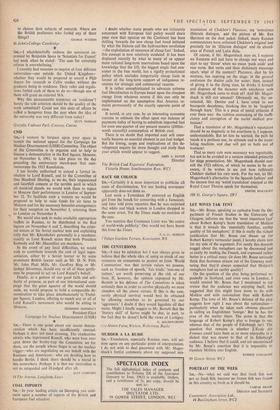COAL IMPORTS Sia,—In your leading article on Dumping you com-
ment upon a number of aspects of the British and European fuel situation.
1 doubt whether many people who are intimately concerned with European fuel policy would share your view that opinion on the Continent has been shifting 'towards the new cheap fuel trend initiated by what the Italians call the hydrocarbon revolution —the exploitation of resources of cheap fuel.' Indeed, this concept is now relatively outdated. It has been displaced recently by what to many of us appear more rational long-term reservations based upon the knowledge that the US, the biggest single fuel con- sumer in the free world, has a rigidly protectionist policy which excludes temporarily cheap fuels in favour of the long-term support of indigenous re- sources for strategic and commercial reasons.
It is rather unsophisticated to advocate extreme fuel liberalisation in Europe based upon the cheapest energy from whatever source if this can only be implemented on the assumption that America re- mains permanently of the exactly opposite point of view.
It would, in any case, be an interesting economic exercise to estimate the effect upon our balance of payments today of having to substitute imported fuel for even one-quarter of our present massive (900m.- worth annually) consumption of British coal.
There is no doubt that imported coal will even- tually become an essential element in our fuel budget. But the timing, scope and implications of this de- velopment require far more thought and study than your article would appear to suggest.
JOHN A. RAVEN Director The British Coal Exporters' Federation,
Victoria House, Southampton Row, WC!






































 Previous page
Previous page